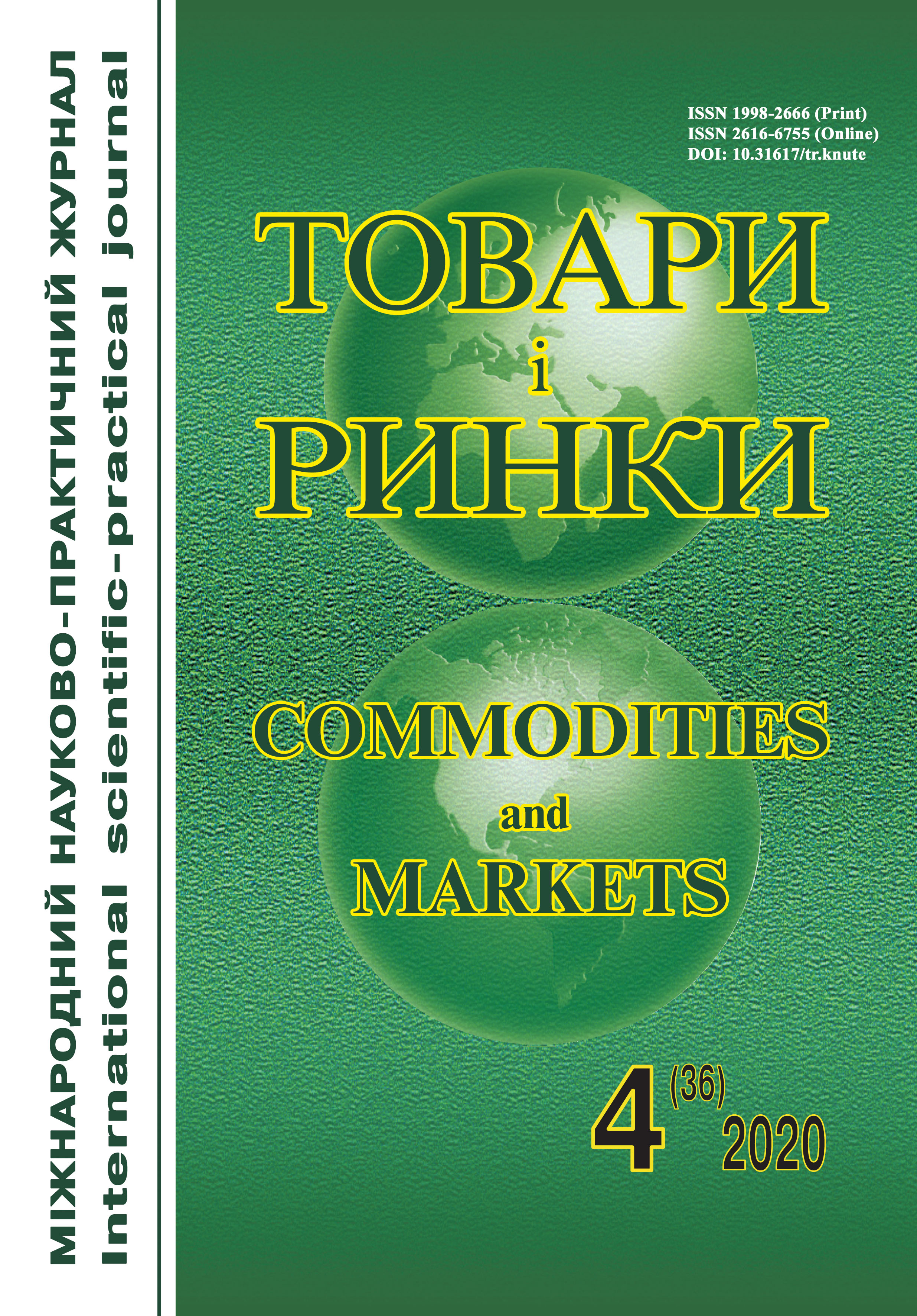Technology of cooked-smoked sausages with iodized salt
DOI:
https://doi.org/10.31617/tr.knute.2020(36)10Keywords:
iodine deficiency, iodized salt, micronutrients, raw meat, cooked and smoked sausagesAbstract
Background. The most effective and cost-effective method of improving the supply of micronutrients is the enrichment of consumer foods, which are the most common and consumed by all groups of adults and children. One of the means of iodine deficiency prevention is iodized salt usage.
The aim of the work is to develop the recipe and substantiate the production technology of cooked smoked sausages for functional purposes with the iodized table salt usage.
Materials and methods. The object of research is boiled-smoked sausage cervelat Vinnytskyi, which recipe includes iodized salt according to DSTU 4307: 2004 and water is replaced by ice. The boiled-smoked sausage of the highest grade – cervelat Ukrainskyi was takenas a control sample.
The quality research of finished sausages was carried out in accordance with the requirements of DSTU 4591: 2006 on organoleptic parameters.
The amount of iodine was determined by the Folgard argentometric method by back titration.
Results. Methods of iodine enrichment of food products are analyzed.
The mineral composition of meat as a raw material for the production of sausages is presented.
Various formulations of mixtures for raw meat salting and formulations of control and test samples of sausages are given. In the recipe of cervelat Vinnytskyi, beef is used 1.7 times less, and pork on the contrary – 2.75 times more. However, neither soy granules nor starch, which is positive, are used in the formulation of the developed product. Also, the type of spicy food additive to enhance the accent of a particular flavor is changed.
The technology of salting ground raw meat with iodized salt is proposed. The obtained data confirm that the majority of organoleptic parameters of the test sample does not differ from the control.
According to the calculations, the sodium iodide content in boiled-smoked sausage, cervelat Vinnytskyi was determined at the level of 50 mcg per 100 g of product, while in the control sample it was absent.
Conclusion. An experimental batch of boiled-smoked sausage cervelat Vinnytskyi of the highest grade with the use of iodized salt was made.
The developed technology of cooked-smoked sausage salting with iodized salt allows to enrich the finished product with micronutrients and prevent iodine deficiency.
The usage of iodized salt for a wide range of sausages requires further medical and biological research.
References
Sajt Vsesvitn’oi’ organizacii’ ohorony zdorov’ja [World Health Organization website]. Retrieved from http://who.int/nutrition/globalnutritionreport/en [in English].
Sajt Mizhnarodnoi’ rady z kontrolju za jododeficytnymy zahvorjuvannjamy "Iodine global network" [Website of the International Council for the Control of Iodine Deficiency Diseases "Iodine global network"]. Retrieved from http://www.ign.org [in English].
Sajt Asociacii’ dijetologiv Velykobrytanii’ [Website of the Association of Nutritionists of Great Britain]. Retrieved from https://www.bda.uk.com/foodfacts/Iodine.pdf [in English].
Kravchenko, V. I. (2016). Jodnyj deficyt jak prychyna vysokoi’ rozpovsjudzhenosti tyreoi’dnoi’ patologii’ sered naselennja regioniv, shho postrazhdaly pislja avarii’ na ChAES [Iodine deficiency as a cause of high prevalence of thyroid pathology among the population of the regions affected by the Chernobyl accident]. Zhurnal Nacional’noi’ akademii’ medychnyh nauk Ukrai’ny – Journal of the National Academy of Medical Sciences of Ukraine. (Vol. 22), 2, 222-229. Retrieved from http://nbuv.gov.ua/UJRN/jnamnu_2016_22_2_12 [in Ukrainian].
Mamenko, M. Je. (2017). Profilaktyka jododeficytnyh zahvorjuvan’: shho maje znaty ta mozhe zrobyty pediatr i likar zagal’noi’ praktyky? (Klinichni rekomendacii’) [Prevention of iodine deficiency diseases: what should a pediatrician and a general practitioner know and can do? (Clinical recommendations)]. Sovremennaja pediatrija – Modern pediatrics, 2, 1-9 [in Ukrainian].
Agostoni, C., Decsi, T., Fewtrell, M et al. (2008). Complementary fee ding: a commentary by the ESPGHAN Committee on Nutrition. J. Pediatr. Gastroenterol. Nutr. (Vol. 46), (pp. 99-110) [in English].
Andersson, M., Aeberli, I., Wust, N. et al. (2010). The Swiss iodized salt program provides adequate iodine for school children and pregnant women, but weaning infants not receiving iodine containing complementary foods as well as their mothers are iodine deficient. J. Clin. Endocrinol. Metab. (Vol. 95), (pp. 5217-5224) [in English].
Gizak, М. Global Scorecard 2016: moving toward optimal global iodine status. Retrieved from http://www.ign.org/cm_data/idd_nov16_global_scorecard_2016.pdf [in English].
Zimmermann, M. B., & Anderson, M. (2012). Assessment of iodine nutrition in populations: past, present, and future. Nutrition. (Vol. 70 (10), (pp. 553-570). Retrieved from https://pubmed.ncbi.nlm.nih.gov/23035804 [in English].
Sil’ jodovana. Tehnichni umovy [Iodized salt. Specifications]. DSTU 4307:2004. Retrieved from http://ukrapk.com/gosts/fish/dsty43072004siliodovana.html [in Ukrainian].
Kovbasy vareno-kopcheni. Zagal’ni tehnichni umovy [Cooked and smoked sausages. General technical conditions]. (2007). DSTU 4591:2006. Kyi’v: Derzhspozhyvstandart Ukrai’ny [in Ukrainian].
Zolotov, Ju. A., Dorohova, E. N., & Fadeeva, V. I. (2002). Metody himicheskogo analiza [Chemical analysis methods]. Moscow: Analog [in Russian].
Nakaz MOZ Ukrai’ny vid 03.09.2017 № 107 Pro zatverdzhennja Norm fiziologichnyh potreb naselennja Ukrai’ny v osnovnyh harchovyh rechovynah i energii’ [Order of the Ministry of Health of Ukraine dated 03.09.2017 № 107 On approval of the Norms of physiological needs of the population of Ukraine in basic nutrients and energy]. Retrieved from https://zakon.rada.gov.ua/laws/show/z1206-17#Text [in Ukrainian].
Oshhypok, I. M., & Onyshko, L. J. (2019). Zbagachennja harchovoi’ syrovyny ingredijentamy dlja stvorennja produktiv zdorovogo harchuvannja [Enrichment of raw materials with ingredients to create healthy foods]. Visnyk L’vivs’kogo torgovel’no-ekonomichnogo universytetu. Serija: Tehnichni naukи – Bulletin of Lviv University of Trade and Economics. Series: Technical Sciences. (Issue22), (pp. 44-51) [in Ukrainian].
Tehnologicheskaja instrukcija po proizvodstvu kolbas polukopchenyh i vareno-kopchenyh [Technological instruction for the production of semi-smoked and boiled-smoked sausages]. (2014). STO 23517941–004–2014. Vinnica: OOO "Nilan-LTD" [in Russian].



